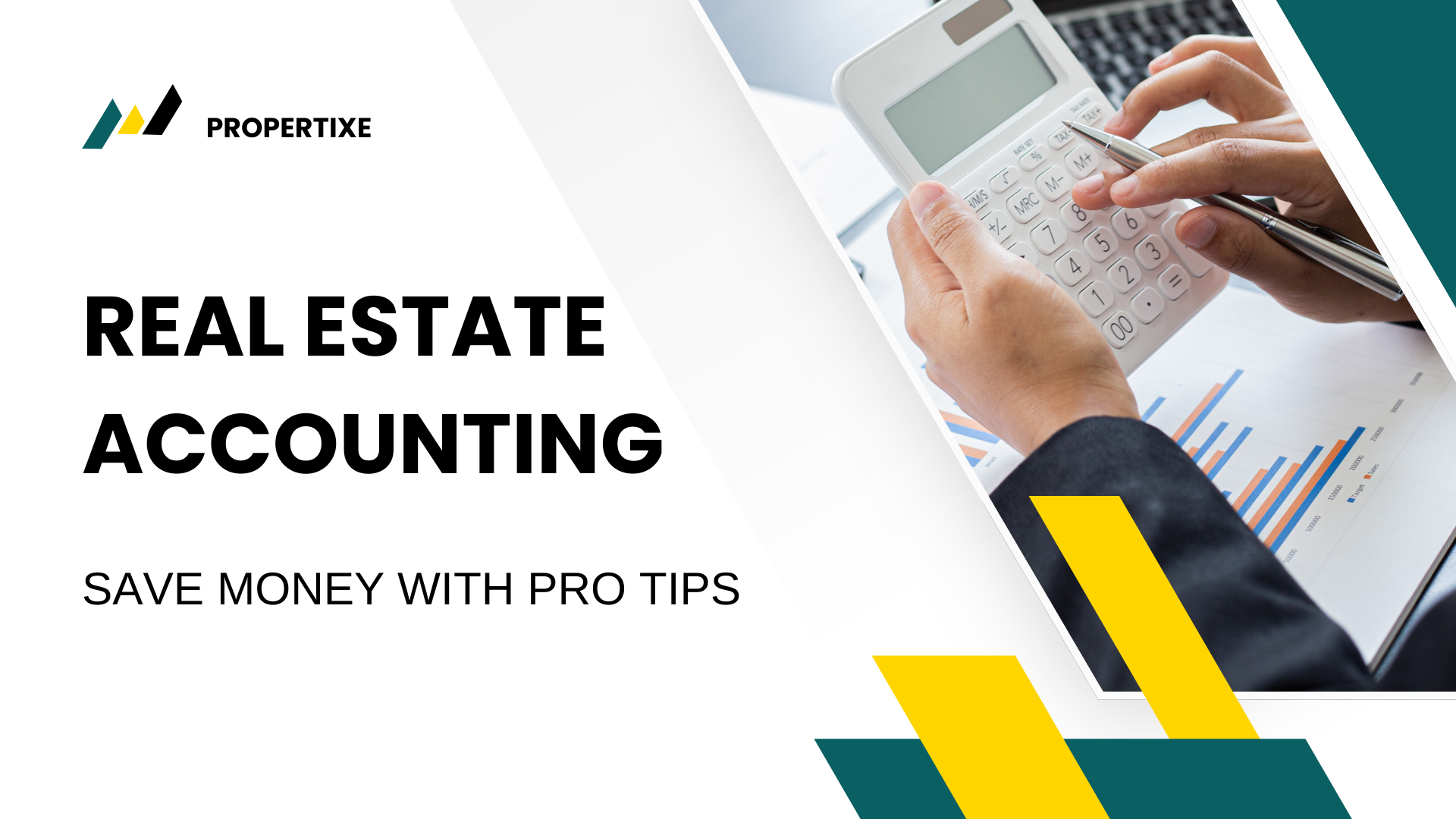Introduction
managing real estate investments could be difficult, especially in the area of accounting. If you’re an experienced investor or are just beginning your journey it’s something we all can recognize the fact that tracking the tax and expense obligations isn’t a stroll in the park. However, what if I informed that by using the correct methods of accounting, you can reduce a substantial amount of cash and increase your profits? In this article I’ll walk you through a few expert Real Estate Accounting strategies which can assist you in reducing costs, lower taxes as well as ensure your investments are actually performing for you.

Problem: The Real Estate Accounting Struggle
It’s true that managing the real estate portfolio involves managing a myriad of costs. From taxes on property to costs for maintenance There’s plenty to monitor. But many investors don’t have a system in place, which leads to errors, missed deductions, and–ultimately–higher costs.
One of the most frequent issues I encounter is that investors are able to mix the personal and corporate finances. This is a dangerous slope and in the absence of clear accounting principles It’s very easy to miss tax-deductible expenditures or not make the most of tax credits that you are entitled to. If you’re not vigilant and don’t pay attention, you could end up spending some money in penalty fees as well as lost opportunities.
Agitation: Why This Is a Bigger Problem Than You Think
Why does this matter? Think about the issue. Investments in real estate typically require huge sums of money. If you’re not at the top of your bookkeeping skills, even a few small errors could make a huge difference. Not recording expenses here, or not calculating an expense there could turn into a huge loss. And, even more importantly is that the IRS doesn’t have any tolerance in taxes on real property.
Let’s look at a real-world scenario in a research study conducted by the National Association of Realtors, those who did not monitor their expenses in a proper manner were able to lose about 30% of the deductions they could have taken each year. It’s a lot of money, and could have been invested in more properties, or utilized to expand their business.
Solution: Real Estate Accounting Pro Tips to Save Money
Let’s change into a new direction and look at ways to solve the problem. There’s good news that with the correct way of approaching accounting, you will be able to stop the bleeding and save funds. These are some strategies that not only simplify your accounting process as well as help you save in terms of taxes and operating costs.
1. Separate Personal and Business Finances
It’s an easy one It’s a fact that I’ve observed a great many investors fail to consider. If you’d like to make things easy create separate accounts at your bank as well as credit cards to fund the real estate investment you make. So, all your expenses for business are recorded, making it simpler to monitor as well as manage and even get tax deductions. Also, it protects you should you be audited.
2. Use Accounting Software for Real Estate Investors
Tracking every process manually is tedious and susceptible to erroneous data. Better to use accounting software specifically designed to real estate investment. Software such as QuickBooks, Buildium, or Stessa are designed specifically to track your earnings as well as expenses. You can even take deductions for taxes. This expenditure will spare you many hours of manual labor and guarantee accurate reports.
3. Stay on Top of Tax Deductions
The market for real estate offers numerous tax benefits which help you save money, from mortgage interest and maintenance of your property. However, you must remain on top of your game. Make sure you keep receipts of all expenditures associated with your investment in property Be sure to ensure your claim every right you’re entitled. Like, for instance Did you know that you are able to deduct property expenses for management, office expenses and business-related travel expenses?
4. Depreciation: Don’t Forget This Game-Changer
A lot of real estate investors do not consider the process of depreciation. This is an opportunity that is often missed. Through depreciating the worth of your home over time and reducing the tax deductible income. It’s one of the best tax methods for investors in real estate but it’s often not utilized. Do not leave cash to chance, and make sure that you’re leveraging your depreciation to the maximum extent possible.
5. Collaborate with a Real Estate accountant
This seems as if it’s a given But, trust me on this one. Real estate accountants specialize in tax law and accounting procedures that are associated with real estate investments. They can assist you in identifying deductions that you may have overlooked and ensure that you are in that you are in compliance with tax laws, as well as provide you with expert guidance about how to arrange your business to achieve maximum effectiveness in taxes.
6. Automate Payments and Record Keeping
The thing I’ve learned throughout my time is that technology is a game changer. Automate bill payment to cover recurring costs such as utilities as well as property management costs as well as insurance fees. This will not only make it easier for you to manage your time, but it’ll make sure you don’t forget any payment or become out of your bookkeeping. Many accounting programs allow users to connect their bank accounts. This means that your payments are automatically tracked and categorised.

MOST SEARCHED TOPICS
1. How to Prepare for a Real Estate Tax Audit
Making preparations for a property tax audit is crucial in order to stay clear of penalties and guarantee the compliance. This article will discuss how to maintain a well-organized record and what documentation you should have in your possession, as well as the best way to collaborate with your accountant to make sure you’re ready. The topic will also cover the most common triggers for audits, for example, under-reporting income or excessively claiming deductions.
2. The Importance of Cash Flow Management in Real Estate
The flow of cash is essential to the survival of every real estate investment. This subject would go further into the significance of managing the flow of cash, including ways to monitor the rental earnings, handle the cost of repairs and maintenance as well as deal with vacant properties. The discussion will also cover how keeping a healthy cash flow guarantees that investors are able to manage unexpected costs.
3. Real Estate Accounting for Commercial vs Residential Properties
The fundamentals of accounting are the same however, the management of finances for residential and commercial properties is different. The following article will explain the distinct accounting methods as well as tax-related the financial aspects for both kinds of property. It will help readers know how they can adjust the accounting strategy depending on the portfolio they own.
4. Understanding Capital Gains Tax in Real Estate
Tax on capital gains is among of the main tax issues that real estate investors must consider. This article will provide an explanation of the way capital gains tax functions and the distinction between both long-term and short-term gains as well as strategies to reduce the tax cost for selling properties, like the use of a 1031 exchange.
5. Real Estate Investment Trusts (REITs) Accounting
REITs are an excellent alternative for those who want to invest in real estate, but not owning physical property. The topic will explain the accounting concepts of REITs, benefits of investing in them, as well as the best way to record dividends or capital gains as well as other elements of REIT investments.
6. Tax Benefits of Owning Multiple Properties
Owners of multiple properties usually get tax benefits that vary. This subject will highlight advantages to owning several properties, including the benefits of accelerated amortization of depreciation, the deduction on mortgage interest as well as how you can consolidate your reports on financials to improve the tax plan.
7. How to Handle Real Estate Accounting for Partnerships
Real estate partnership are quite common however they pose specific accounting problems. This post will explain how to handle the shared profit, monitor expenditures, and share the profits when there are multiple investors in the partnership. The section would also address the tax implications as well as the reporting requirements for real estate partnership.
8. The Role of Depreciation Recapture in Real Estate Sales
The process of depreciation is triggered in the event that you sell a home and you are required to be taxed on deductions from depreciation that you’ve earned. The following article will go into more detail on how depreciation operates, how it affects the tax burden when you sell a home and the best strategies for tackling the tax liability.
Personal Opinion Paragraphs
- It’s been my experience that mixing business and personal finances could lead to chaos. It took me some time to find my way however, once I had divided my accounts, things was much simpler to handle.
- When I first got started with software for accounting initially, I was skeptical. Let me tell you that it has helped save me numerous hours and even money, by finding the mistakes that I could have missed.
- In truth, I used to not think about tax deductions as that they were not a big make a difference. However, once I began tracking every cent I was able to see how much I had left in the tax jar. Since then, I’m making sure that I take every deduction available.
- The concept of depreciation wasn’t something I could completely comprehend at first. After I delved into the subject, I was amazed at how much it helped reduce my taxable earnings. Do not make the same error I made, and benefit from this method.
- I believed I could manage all the details on my own, but the experience of working with an accountant for real estate has been a game changer. Their experience helped me save a lot of time and anxiety and I’m happier with my financial decisions today.
- Making payments automated and keeping records has been a major boost in productivity for me. It allowed me to focus on different tasks, and also ensured I never missed deadlines. In all honesty, I would not ever go back to manual monitoring at this point.

Conclusion
The accounting for real estate does not have to be difficult. By implementing a few simple strategies–separating personal and business finances, using specialized software, claiming all eligible tax deductions, leveraging depreciation, working with a professional accountant, and automating tasks–you can save both time and money.
Keep in mind that being active and organized is the key. If you can take charge of your finances today and in the future, the better place you’ll find yourself in when it comes to growing your real estate company. Don’t let bad accounting practices hinder your progress. Start applying these tips now and see your investments grow.
FAQS
1. What exactly is real estate accounting?
Real estate accounting is the systemic recording, analysis and report of financial transactions relating to investments in real estate. It includes tracking the earnings, expenditures, taxes and various financial operations for accurate financial reporting as well as compliance with tax law.
2. How can I distinguish my personal and business financials when it comes to the real estate market?
Separating business and personal finances can help you to keep your real estate investments organised, makes tax filing easier as well as ensuring that you do not miss tax-deductible expenditures. Also, it protects you should you be audited and helps you monitor your investment’s performance.
3. What can accounting software do to assist in the process of accounting for real estate?
Software for accounting specifically designed to real estate investors can help simplify accounting, financial tracking, expense categorization and identification of tax deductions. It guarantees accuracy, helps save time and gives you information that can aid you in making better choices in financial matters.
4. What are the most important tax benefits for real estate investment?
Real estate investors are able to benefit from deductions on a range of expenses such as home repairs, mortgage interest as well as property management charges along with travel and depreciation. Deductions like these can drastically reduce the tax liability of your income as well as to save money on tax.
5. Depreciation is a term used in real estate? How is it used?
Depreciation lets you reduce the value of the property over a period of time (usually 27.5 years in the case of residential property). This reduces the amount of tax you owe and can reduce the overall tax burden. In essence, it’s a method to deduct the gradual decline in value to tax-related reasons.
6. What are the reasons to hire an experienced real estate agent?
An accountant who specializes in real estate is skilled in tax regulations and financial techniques that are specific in real estate. They are able to help you find deductions that may be missed as well as ensure your the compliance of tax laws and maximize your real estate company to maximize profits.
7. What are the dangers that arise from not completing the accounting for real estate properly?
A lack of proper accounting could cause missing deductions, incorrect financial statements and even legal problems. As time passes, small errors will escalate into expensive penalties as well as audits. This could lead to a inability to assess your business’s financial situation.
8. What kinds of expenses are eligible to be deducted from the accounting for real estate?
The most common deductions are expenses for property maintenance as well as property management charges such as mortgage interest, utilities bills, insurance premiums as well as advertising expenses. costs for home offices to real estate professionals who work at home.
9. What can be automated to improve the real estate accounting process?
Automating accounting processes can simplify the process through the setting of periodic bill payments, automating expense categorization, and real-time synchronization to accounts at banks. This helps reduce errors and conserves time. It can also help you stay organized and on top of your money.
10. How often should I make corrections to my record of property transactions?
It is essential to check your financial records regularly as well as, ideally, each month.

